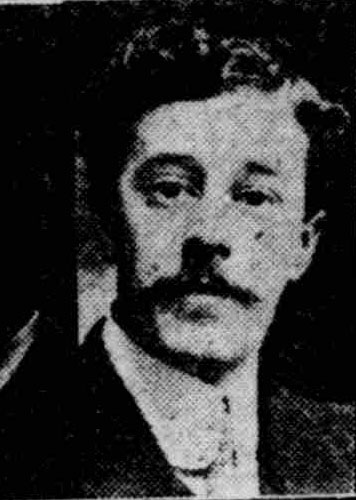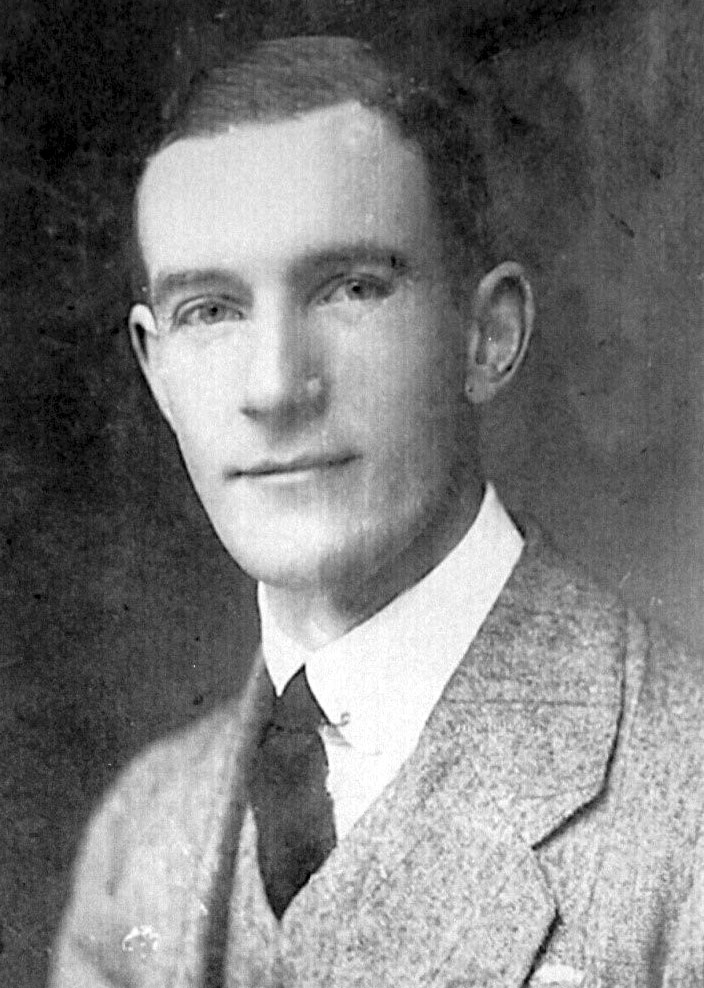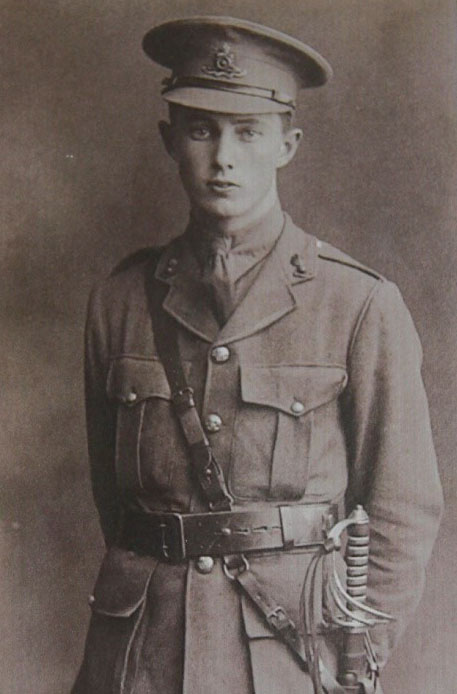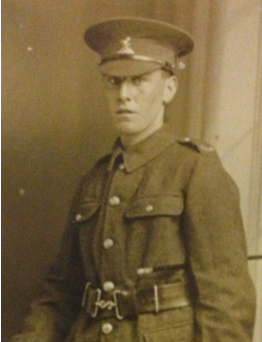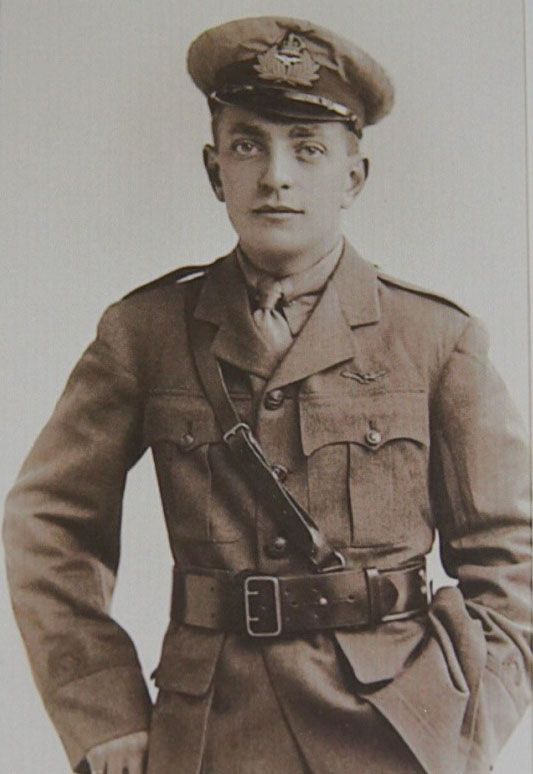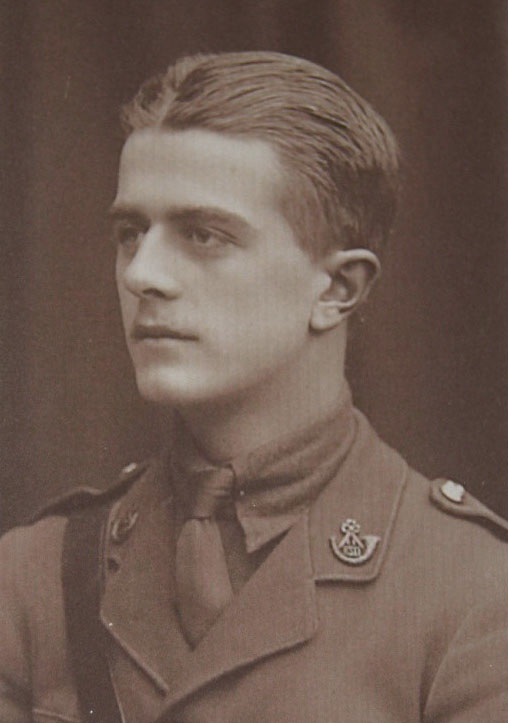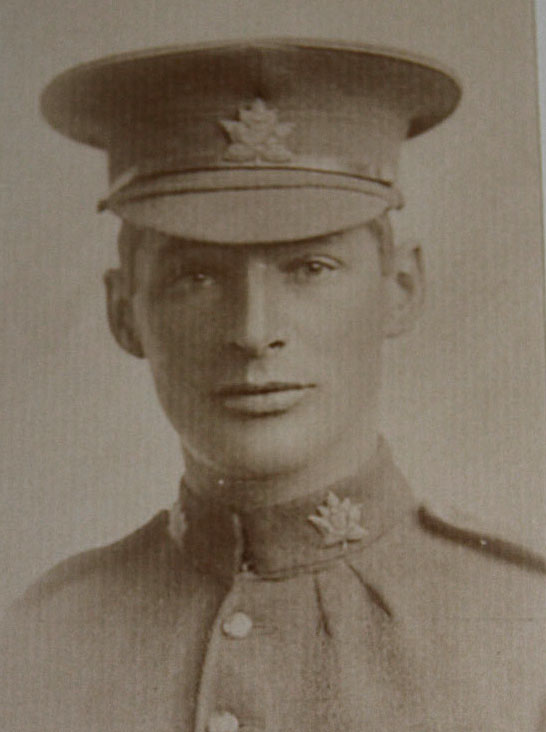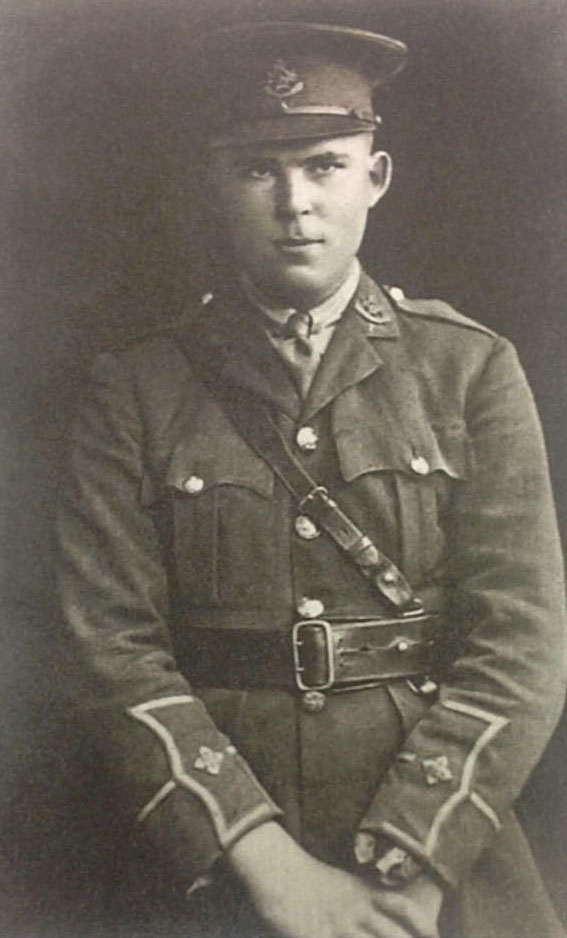Tonbridge men who died in World War I: A – C
▲Up
►Next
A
Frederick
Charles Adams was born at Brasted, Sevenoaks in 1883. He was working as
a barman at the Swan Hotel, East Grinstead at the time of the 1911 census,
but he seems to have moved to Tonbridge in 1912 or thereabouts, and to have
worked with his brother, A. A. Adams, who had a fruiterer’s shop at 13 High
Street. Tonbridge. He enlisted at Tonbridge in March 1916 and served as
Private 40212, 8th Battalion, Leicestershire Regiment. He went to France in
August 1916 and died of wounds on the 29th September 1916, and is buried at
Heilly Station Cemetery, Mericourt-L’Abbe.
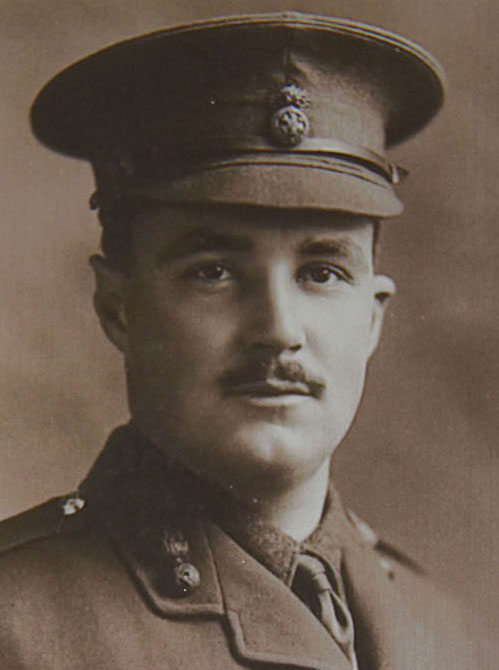
Alfric Euan
Allies was born in 1890 at Alfrick, Worcestershire, a son of Mr and Mrs
Alfred Edward Allies. He was educated at Mr Bickmore’s Yardley Court School
and Tonbridge School [1905 – 1909]. He worked for a year for Mr J. Le Fleming
at Eton House, and then went to Brasenose College, Oxford in 1910. He
graduated in 1913 with an honours degree in jurisprudence and subsequently
joined the Inner Temple. He was gazetted as [Temporary] 2nd Lieutenant in
8th [Service] Battalion Royal Welsh Fusiliers on 9th September 1914.
Promoted to Lieutenant on 1st February 1915. He left England on 29th June
for the Dardanelles. He was killed in action at Gallipoli on August 16th
1915 aged 24 years.
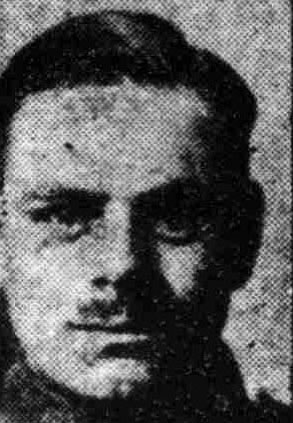
Arthur Bertram
Andrews was born in 1896 at Shipbourne, the third of six children born
to Stephen and Alice Andrews. He enlisted in the Royal West Kent Regiment in
June 1915 and served with the 6th Battalion as Private 201187. He was
wounded in late August 1918 and although at first it was thought he would
survive he died of his wounds on the 26th August in a military hospital in
France; he was aged 22 years. He is buried at Daours Communal Cemetery
Extension. The news was delivered to his parents who at that time resided at
17 Meadow Road.
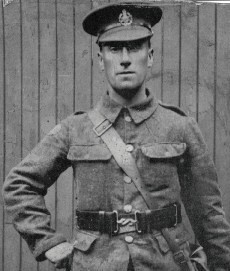
Robert Arnold
was born in the West Derby district of Liverpool in 1880. He came to
Tonbridge in about 1907 to work for Truscott and Sons as a bookbinder and
book edge marbler. He played for the local football team. He was an active
member of his trade union, and held the post of treasurer in his local
branch of the National Union of Bookbinders and Machine Rulers. He enlisted
in January 1916 at Tonbridge and served with both the London and Middlesex
Regiments, at time of enlistment he was recorded as living at 48, Vale Road.
At the time of his death, he was killed in action on 20th May 1917, he was
serving with the 1st/7th Battalion Middlesex Regiment, Private TF/203917. He is remembered on the Arras Memorial.
George Ashwell
was born in Biggleswade, Bedfordshire in 1887, the son of John and Elizabeth
Ashwell. In 1899 he married Clara Jane Parker at St Thomas-in-the-Moors,
[Balsall Heath] Worcester. By the time of the 1911 census George and his
family were living at 74, Shipbourne Road, Tonbridge, and George was working
as a bricklayer. He enlisted as a sapper 1552 in the 1st/1st Kent Field
Company Royal Engineers on 26th October 1914. He died of wounds sustained at
Gallipoli on 5th December 1915 and is buried at Alexandria (Chatby) Military and War Memorial Cemetery.
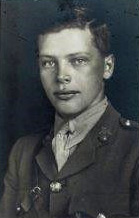
Edward
John Austen was born at Tonbridge in 1895, the eldest of two children
born to John Charles and Jessie Cornelia Austen. In 1911 recorded as living
at 40 Pembury Road. He was educated at Tonbridge School, joined the Inns of
Court Officer Training Corps on 16th November 1914, and gazetted 2nd
Lieutenant in the London Regiment on 3rd April 1915. He was promoted a
Temporary Lieutenant on 30th November 1915, and went to France in January
1916. He was wounded on more than one occasion, and killed in action aged 22
on 23rd March 1918 whilst serving with the London Regiment [Royal Fusiliers]
3rd Battalion. He was mentioned in dispatches and recommended for the DSO.
He is remembered on the Pozieres Memorial.
Harold
Austen. No record for a Harold Austen with a connection to Tonbridge has
been found – all references seem to be for Harold Edward Austen – see next
entry.
Harold Edward Austen was born in 1894 in Tonbridge, the
second of two children born to Charles Edward and Emma Elizabeth Austen. In
1911 he is recorded as living at 5 The Crescent (Havelock Road). Before
enlisting on 10th June 1915 he worked as a clerk for Messrs Freer and Brown,
solicitors. He served initially with the Buffs [Sergeant 2520], then was
transferred to the Royal Irish Rifles. He was a Sergeant [40155] with the
14th Battalion Royal Irish Rifles when he was killed in action at Messines
Ridge in France on the 7th June 1917.
He is buried at Spanbroekmolen British Cemetery.
George Avery
[not on the original memorial] was born in Tunbridge Wells in 1899, the
second child of six born to Isaac Albert and Ada [Staplehurst] Avery. By
1911 the family were living in Judd Road, Tonbridge, having previously lived
at Southborough. George had served with the Yeomen Cyclists and he was
killed in action at Kemmel, Belgium, aged 19 on the 24th April 1918 whilst
serving with the 7th Battalion, Royal West Kent Regiment, Private G/30531.
He is buried at Hangard Communal Cemetery Extension.
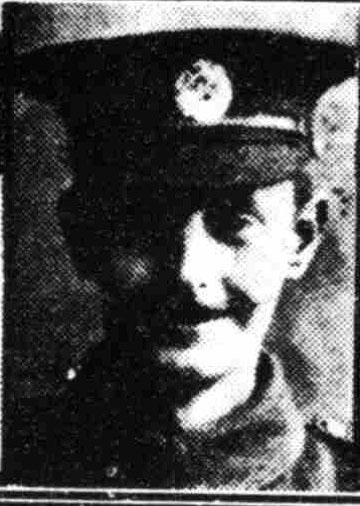
Cecil Obediah
Avis was born in Tonbridge in 1887, a son of Henry and Mary Avis. He
married Mary Ann Ongley at Tonbridge in 1910, had two children and
lived at 5 Fosse Road. He was a picture framer for Flemons before
joining up. In 1915 he joined the Home Counties Royal Engineers and was
subsequently transferred to the 11th Battalion, The King’s Liverpool
Regiment, in which regiment he was serving, Private 87831, when he was
killed in action on 21st March 1918. He is remembered on Pozieres Memorial.
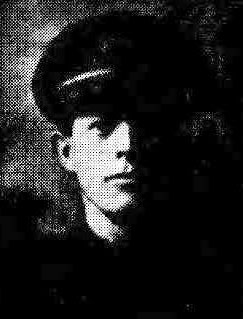
Frederick Avis
was born in 1892 at Tonbridge, the eldest son of Philip and Violet [Card]
Avis. After leaving school he worked as a boot maker and lived in Garden
Road Tonbridge. He then enlisted in the Royal Engineers on the 28th December
1914 and subsequently went to France on 15th June 1915. He took part in the
Battle of Loos on the 25th September following, and in many other
engagements. He was wounded in February 1916, and invalided home. He
re-joined his regiment in France on 28th June that same year and was killed
in action serving as Sapper 58680 with the 255th Tunnelling Company near
Ypres on 31st May 1918. He is buried
at Lijssenthoek Military Cemetery.
Spencer Avis
was born in Seal near Sevenoaks in 1874, the son of Benjamin and Annie Avis.
He married Florence Vere Coltham in 1903 at Canterbury, Kent and she is
recorded as living at 4 Cromer Street at the time of his death. He seems to
have been a regular soldier; in 1911 he was a lance sergeant 6299 serving
with the 18th [Queen Mary’s Own] Hussars at Aliwal Military Barracks, South
Tedford, Hampshire. He was listed as a saddle tree maker. He went to France
with his regiment on the 15th August 1914. He was in action at the battles
of Mons and Le Cateau, the retreat from Mons, and then the battles of the
Marne, the Aisne, La Brassee, Messines, Armentieres and Ypres – all in 1914.
In the following years he saw further action at: Gravenstafel, St. Julien,
Frezenberg, Bellewaarde, the Somme 1916 '18, Flers-Courcelette, Arras 1917,
Scarpe 1917 and Cambrai 1917.
Spencer Avis died on the 19th April 1917 aged 41 and was buried at Etaples
cemetery.
Henry Kent
Axelby [aka Henry Kent Brunning] was born in Preston in 1895 and was the
adopted son of John and Louisa Brunning
recorded as living in Lavender Hill. Before he enlisted in September
1914, Private G/1547, 7th Battalion Royal West Kent Regiment, he worked for
the Tonbridge Free Press as an apprentice compositor. He was mortally
wounded on 3rd July 1916 by shell fire whilst acting as a stretcher bearer
and died, despite all that could be done, at the dressing station. He is
buried at Carnoy Military Cemetery.
B
Humphrey Babington was born at
Tonbridge in 1884 the son of John and Emily Babington. He was educated at
Tonbridge School, recorded as living at 88 Hadlow Road, and then employed
as a clerk by the Union Bank of Australia in the UK. He emigrated to
Australia in February 1914. He attested for service with the Australian
Imperial Force on 19th August 1915 at Adelaide, Private 2973, and served
with the 32nd Battalion. He was admitted to 5th Division Rest Station, 8th
Australian Field Ambulance, on 27.4.17 suffering from bronchitis and
debility, and was transferred to 9th Casualty Clearing Station on 1.5.17 but
died the same day. His body was interred in the Aveluy Communal Cemetery
Extension, one mile north of Albert, France.
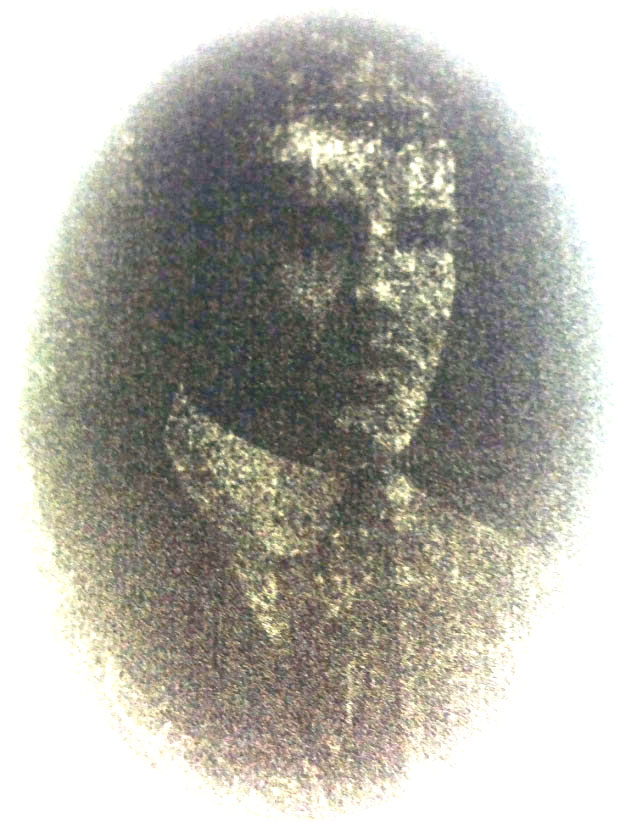
Herbert Donald Baldwin was born in Tonbridge in
1891 the son of Charles and Jane Baldwin. He married Elizabeth Amy Evans at
Lewisham in 1915, and recorded as living at 40 Quarry Hill. He served in the
Yeomanry prior to the war and subsequently from May 1915 as a 2nd Lieutenant
in the 156th Brigade Royal Field Artillery. He was hit by a shell near
Mametz Wood on the 18th July 1916 and lived for about an hour, despite
receiving medical attention. He is buried at Heilly Station Military
Cemetery, Mericourt-L’Abbe.
James Baldwin was born in about 1876, probably at
Oxted, Surrey. He married Harriet Sherlock at Tonbridge in 1896 and
subsequently had two children. In 1901 he was working as a general labourer,
by 1911 he was working as a labourer at the Powder Works. He enlisted in the
Royal West Kent Regiment Private GS/4643 1st Battalion, on the 23rd November
1914 at Maidstone; he had previous military experience with the 3rd RWK. At
the time of enlistment he was recorded as living at 1 Peach Hall High Street
Tonbridge. He went to France on the 12th May 1915 and was killed in action
on the 22nd July 1916; he has no known grave and is recorded on the Thiepval
Memorial.
Henry William Barling was born at Maidstone in
1875, the son of William and Ann Barling. He joined the Royal Navy on 9th
December 1895 as a Stoker. He worked his way up and on 1st July 1913 had
risen to the rank of Chief Stoker, serving on HMS Vanguard. In 1906 he
married Frances Matilda Pilcher at Sheppey; the couple had two children and
lived in Sheerness (although his parents lived in Landsdown Road Tonbridge). On 30th July 1914 he joined HMS Aboukir as Chief Stoker. On 22nd September
1914 his ship, and another two ships, were torpedoed and sunk by German
U-boats whilst on patrol. Henry Barling was seen to be clinging to a piece
of wreckage after the ship sank, but gave up his hold in favour of another
stoker who was having difficulty keeping afloat. He was not seen again. He
is recorded on the Chatham Naval Memorial.
Henry Frederick Bartholomew was born in Tunbridge
Wells in 1891 the eldest child of nine born to Henry and Amelia Bartholomew.
In 1911 the family were living at Priory Road, Tonbridge, and Henry
Frederick was working as a compositor for Whitefriars Press. He enlisted at
Tonbridge in September 1914 in the Royal West Kent Regiment and was
eventually a Sergeant, G/1532, in the 7th Battalion. He married Dora Leigh
at Tonbridge in 1915. He was killed in action at Trones Wood on 18th July
1916; he has no known grave and is recorded on the Thiepval Memorial.
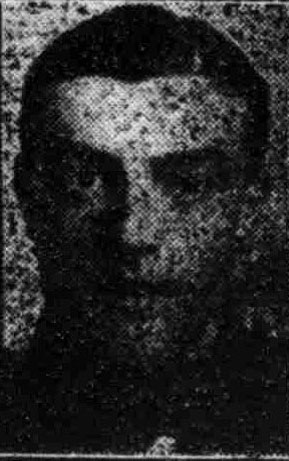
Albert Mitchell Barton was born at Eltham in 1894.
In 1901 he was living with his grandmother, Hannah, and her unmarried
daughter, Kate, at Shipbourne Road, Tonbridge. By the time of the 1911
census he had begun work as a type carrier at one of the town’s printing
works. He married Ethel M. Hollamby [See John George Hollamby ] in 1915 at
Tonbridge. He enlisted in 1916 as Private G/24583, 1st Battalion Royal West
Kent Regiment and went to France in January 1917. He was killed in action on
27th September 1918 and is buried at Marcoing Military Cemetery.
Edward Batchelor was born in Tonbridge in 1881,
the son of William and Ellen Batchelor. After leaving Judd School he first
worked for an Australian shipping firm as a clerk. He then passed the
qualifying exam for the Civil Service and became a clerk in the War Office.
He became an accountant, firstly in the War Office and then in the Health
Insurance Commission. He married Sarah Mitchell at Salisbury in 1907 and
lived at Streatham Park London (parents still recorded as living in Lavender
Hill, Tonbridge). In December 1915 he enlisted in the Artists’ Rifles, being
gazetted as Lieutenant in the London Regiment in September 1916. He went to
France in November 1916 and was killed by a trench mortar on 26th September
1917. He is buried at Orchard Dump Cemetery, Arleux-en-Gohelle.
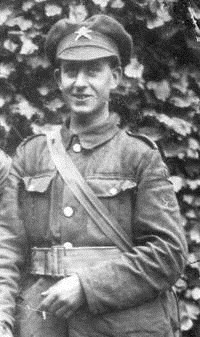
Sidney Batchelor was born at Leigh in 1896, the
son of Benjamin George and Annie Laura Batchelor. Recorded as living at 22,
Powder Mills. He worked as a reader in one of the town’s printing works and
then as a painter for the L & NW Railway. He enlisted in the Royal Fusiliers
in March 1916 and then was transferred to the Machine Gun Corps on June
1916, as Private 35950. He went to France on 26th July 1916. He was wounded
on the 26th April 1918, a gunshot wound to his shin; recovered and went back
to his unit on 24th May 1918. He was subsequently killed in action on 20th
July 1918 and was buried at La Clytte Military Cemetery.
William John Batchelor was born in Tonbridge in
1891, the son of James Edward and Margaret Batchelor. He worked as a printer
for Truscott Printers in Tonbridge. In 1913 he married Edith L. Keys at
Tonbridge. At the time of his death his wife was recorded as living at 126
St Marys Road. He served with the 1st/6th Battalion, Durham Light Infantry
as Private 79577, W Company. He was captured at the end of May 1918 and died
of dysentery as a Prisoner of War on the 24th October 1918 at a hospital in
Worms. He is buried in the Hochheim Hill Cemetery, Worms.
Amos Leslie Bathurst was born at Tonbridge in
1893, the son of Stephen John and Jemima Stuart Bathurst and recorded as
living in Hawden Road. He enlisted with the 4th Battalion Royal West Kent
Regiment [Territorial Force] on 22nd May 1911; at that time he was working
as a butcher’s assistant for Messrs Waghorn, Butchers, Tonbridge. On 26th
October 1914 he signed the release which would enable him to serve overseas.
He was subsequently transferred to the 7th Battalion and then the 8th as
Private G/19023. He went to France on the 8th December 1916. He was killed
in action on 19th June 1917; he has no known grave and is commemorated on
the Ypres [Menin Gate] Memorial.
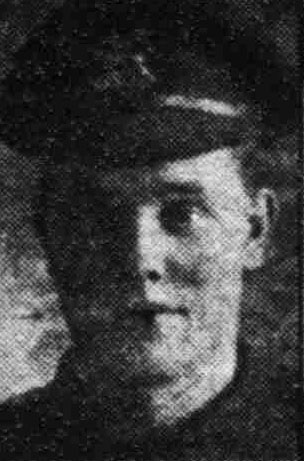
Harry Alec Beach was born in Tonbridge in 1898,
the son of Charles and Selina Beach. He enlisted as Private G/6365 on
the 11th May 1915 in 1st Battalion East Kent Regiment – The Buffs, at this
time he lived in Lavender Hill. He went to France on 30th May 1916. He was
wounded on the Somme on 23rd September 1916, then returned to his unit on
8th January 1917. In the Spring of 1917 he was hospitalised in France for a
month with shell shock, but again returned to his unit. He was killed in
action by shell fire on 23rd March 1918. He has no known grave and is
commemorated on the Arras Memorial.
Charles George Bellingham was born at Halstead in
1893, the son of Frank and Naomi Bellingham. He worked as a fireman on the S
E & C Railway. In 1916 he married Emily T. Pettitt at Tonbridge and lived in
Pembury Road. On 7th March 1917 he enlisted in the Royal Engineers, 80th
Broad Gauge Workshops Company and was appointed Corporal WR/269995. He died
from influenza at Rouen on 3rd November 1918, leaving a widow and daughter.
Frederick Bennett was born at Tonbridge in 1889,
the son of Frederick and Emily Bennett. In 1910, when he was 22 years old,
he emigrated to Canada and was living in Vancouver when the war began. He
enlisted in December 1917 and served as Private 4080123 29th Battalion,
Canadian Infantry. He was killed in action on 9th August 1918. He has no
known grave and is commemorated on the Vimy Memorial.
Henry Richard Bennett was born at Chislehurst in
1896, the son of Henry Edward and Agnes Mary Bennett. He attended Tonbridge
School, leaving in 1915 to go to the Royal Military Academy at Woolwich. He
was then gazetted as a lieutenant in the Royal Field Artillery later that
same year. At the time of his death in a French hospital on 4th August 1918
he was serving with the Royal Horse Artillery, 3rd Cavalry Division. He is
buried at Tincourt New British Cemetery.
Thomas Edward Bennett was born at Tonbridge in
1891, the son of Thomas and Emily [Nye] Bennett; Thomas senior died in
1896.At the time of the 1911 census Thomas and his widowed mother were
living at St Margaret’s Place, Tonbridge, and Thomas was working as a wash
house man in a local laundry. He served as Gunner 38961 Royal Field
Artillery. He first went to France on 27th July 1915 and he was killed in
action on 28th September 1917 whilst serving with “B” Battery, 84th Army
Brigade. He is buried at Vlamertinghe New Military Cemetery.
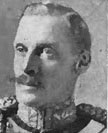
Edwin Berkeley Cook was born in London in 1869 and
educated at Eton. He was a career soldier, first gazetted as a Lieutenant in
the 1st Life Guards in 1890. He served in India for many years. At the
beginning of the war he was Lieutenant-Colonel in the 1st Life Guards and
went to France with his regiment. He was wounded on 21st October 1914 near
Messines and subsequently died on 5th November 1914 in London. He was buried
at East Peckham. His father was a Tonbridge resident recorded as living at
Roydon hall.
Ernest Arthur Bissenden was born at Tonbridge in
1890, the son of William and Esther Bissenden. Ernest worked as a postman for
the G.P.O. 1911 recorded as living in Lavender Hill. In 1915 he
married Sarah Twiner at East Grinstead and in August of that year he also
enlisted. He served with the Norfolk Regiment and then, after going to
France in June 1916, he was transferred to the 1st/7th Battalion
Worcestershire Regiment as Private 41293. He died of wounds on 10th October
1917 and is buried Dozinghem Military Cemetery.
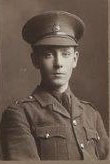
Arthur Worsley Blackden was born in Cambridge in
1898, the son of Brigadier General Leonard Shadwell and Mary Helen [Pike]
Blackden. He was educated at Tonbridge School 1911 – 1915, thence to the
Royal Academy at Woolwich and then gazetted as 2nd Lieutenant in the Royal
Field Artillery on 22nd October 1915. He went to France on 3rd May 1916 and
was killed in action on 28th September 1916, in the Gird Support Trench,
north of Flers, on the Somme front. Whilst selecting a position for his
battery a shell burst over his head, killing him instantaneously. He was
buried in the parapet of the trench and remembered on Thiepval Memorial.
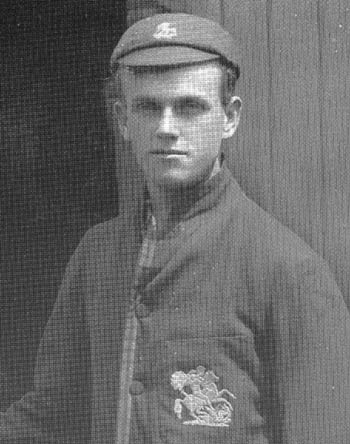
Colin Blythe was born in Deptford in 1879, the son
of Walter and Elizabeth Blythe. He became a professional cricketer who
played for Kent and England. He married Gertrude Janet Brown in 1907 at
Greenwich. By 1911 the couple were living in Goldsmid Road, Tonbridge. On
the outbreak of war he enlisted with the King’s Own Yorkshire Light Infantry
serving as Sergeant 49296 in the 12th Battalion, and was killed in action at
Passchendaele on 8th November 1917. He is buried at Oxford Road Cemetery.
Arthur Boakes [brother of Richard Daniel] was born
at Leigh in 1882, the son of George and Marie Boakes, and recorded as living
at Powdermill cottages. By the time of the 1901 census he was serving with
the Royal West Kent Regiment. In 1905 he married Margaret Ellen Matilda
Mannering and in 1911 was working as a shepherd at Broughton Farm, Kemsing.
Following the outbreak of war he was back with the Royal West Kents, serving
as Sergeant 21043 in the 6th Battalion. He went to France on 23rd December
1915 and was killed in action on 9th August 1918; he is buried at
Ville-Sur-Ancre.
Richard Daniel Boakes [brother of Arthur] was born
at Leigh in 1886, the son of George and Marie Boakes. Before the war he
worked as a farm carter. He enlisted in the Army Service Corps as Driver
T2/017842, and went to France on 23rd June 1915. He married Daisy Parsons at
Tonbridge in 1916. He was serving with the 229th H.T. Company attached to
34th H.Q. when he died, probably in the ‘flu epidemic, on 17th November
1918. He is buried at Kortrijk Communal Cemetery.
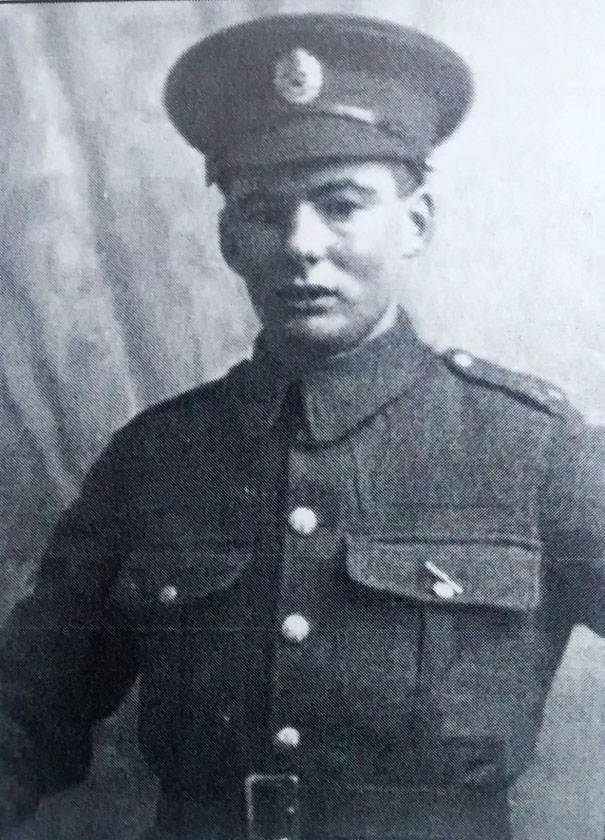
Cecil John Bone [incorrectly listed as “Bones” on
the memorial] was born at Tonbridge in 1896, the son of John and Elizabeth
Bone. In 1911 recorded as living in Houselands Road, but later moved to High
Brooms. He worked as an assistant in a clothes shop and then a fruiters; he
was also a Territorial in the Royal Engineers, serving as Sapper [T] 854. He
was a member of the party of men, Royal Engineers 1st/3rd Kent Field
Company, who sailed off to Gallipoli on HMS Hythe, which was sunk on route
from Mudros to Cape Helles, on 25th October 1915 following a collision with
HMS Sarnia. Like many of the men on board he drowned and is commemorated on
the Helles Memorial.
Jack Boorman was born at Tonbridge in 1890 the son
of George and Caroline Boorman. Jack enlisted in the Rifle Brigade at
Tonbridge on the 18th April 1907. He served for some years in India with the
Rifle Brigade, returning to England on 22nd October 1914, and he was
promoted to the rank of Corporal 2066 on 25th October 1914. He went to
France on 5th November 1914 and then on the 5th February 1915 he was
transferred to the Army Cycle Corps as Corporal 3288 8th Division Cyclist
Company. At the time of his death his parents are recorded as living in
Pembury Grove. He was killed in action on the 9th March 1915 and is buried
at the Royal Irish Guards Graveyard, Laventie.
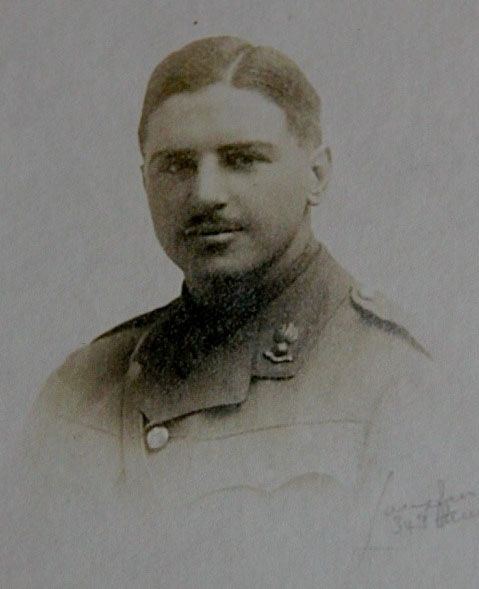
Arthur Frederick Botham was born at Islington in
1889, the son of Harry Algernon and Sarah Botham. He joined the staff of
Tonbridge School in January 1913 as a teacher of mathematics. On the 5th
August 1914 he enlisted in the Honourable Artillery Company and served
initially as a Gunner, later a Bombardier in Egypt defending the Canal. In
the autumn of 1915 he returned to England to take a commission in the
Special Reserve, Royal Field Artillery and went to France shortly
afterwards. He was mortally wounded on 18th June 1917 and died before
reaching the casualty clearing station. He is buried at Lingesthoek
Cemetery, Poperinghe.
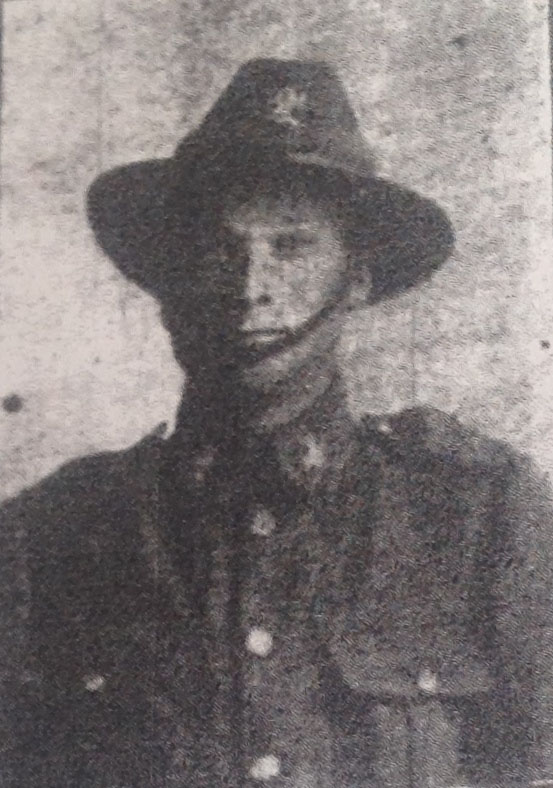
Henry Bottle was born at Ticehurst in 1895, the
son of William Henry and Caroline Bottle. In 1911 recorded as living in
Barns Street Golden Green. He was a farm labourer and in March 1914 he was
one of the men taken from the UK by the New Zealand Government Immigration
Department to work on farms in New Zealand. On the outbreak of the war he
enlisted, Private 6/1470, in the Third Reinforcements of the New Zealand
Expeditionary Forces. Henry Bottle was shot on 20th May 1915 whilst landing
from HMT Galeka - part of the landing force at Gallipoli. He died of his
wound on board the ship and was subsequently buried at sea.
Alfred Bourne was born at Tonbridge in 1884, the
son of Frederick and Selah [Cook] Bourne and lived in Shipbourne Road. In
1916 he enlisted as a Sapper in the Royal Engineers, 491st Company and went
to France in August 1917. He was posted missing in June 1918, later
confirmed as killed. He has no known grave and is commemorated on the Arras
Memorial.
Robert William Bradbury was born at Chesterfield,
Derbyshire in 1896, the son of Edward and Clara Bradbury. Edward Bradbury
worked as the Registrar of births and deaths and the Relieving Officer of
the Tonbridge Board of Guardians, and Robert William was employed as a clerk
at the offices of the Tonbridge Free Press after he left Judd School. He
lived at 12 Woodfield Road. He enlisted on 28th August 1914,
initially with the King’s Royal Rifles, before being transferred to the Army
Cyclist Corps where he served as Lance Corporal 208 VI Corps, Cyclist
Battalion. Robert William Bradbury was killed near Souchen on Sunday 11th
June, hit by a bullet in the side when returning to the trenches across the
open with a “wiring” party. Efforts were made to bring him round, but he
never regained consciousness.
Alfred Richard Breeze was born in Buckland, Dover
in 1882. In 1907 he married Mabel Eleanor Pallett at Dover. Following the
birth of their child, Hilda, at Dover in 1910, the family moved to 72 High
Street, Tonbridge where Alfred was employed as a clothier’s manager. Alfred
served as Private 400393 in the 13th Battalion, Essex Regiment. He was
killed in action on 30th November 1917 at Cambrai. He has no known grave and
is commemorated on the Cambrai Memorial.
Percy Bridges was born in Tonbridge in 1894, the
son of Ernest and Fanny Bridges. By the time of the 1911 census Percy had
enlisted and was serving as a Private with the 1st Battalion East Lancashire
Regiment. At some point he was transferred to the 2nd Battalion, Private
10313, and was serving with them at Wijnberg, South Africa in August 1914
when the war began. The Battalion returned to England via Southampton on
30th October 1914, and subsequently went to France on 6th November 1914.
Percy was killed in action at Fricourt on 7th July 1916; he has no known
grave and is commemorated on the Thiepval Memorial. At the time of his death
his parents were recorded as living at 1, Houselands Road.
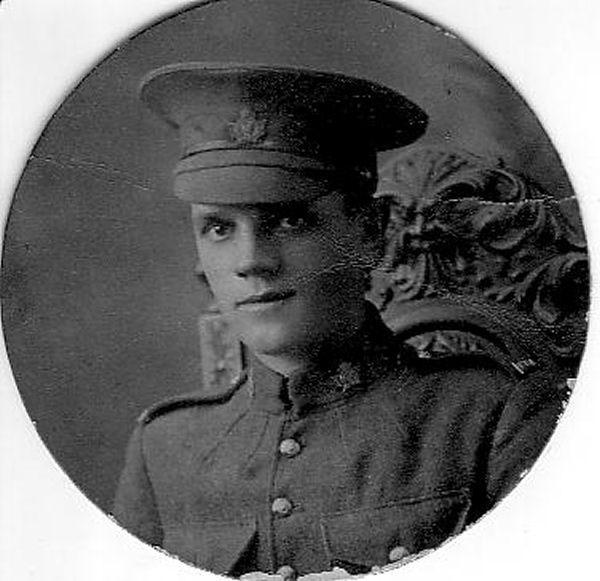
Percy Bristow was born at Tonbridge in 1896, the
son of Edward and Emma Bristow. After leaving school he worked as an errand
boy for a newsagent and lived at 28 Hawden Road. He also enlisted in the
Kent Cycle Battalion, in which he served for 18 months. Before the outbreak
of war he emigrated to Canada. On 19th May 1915 he attested for service as
Private 410037 with the 38th Battalion Canadian Expeditionary Force. He was
killed inaction on November 18th 1917. He has no known grave and is
commemorated on the Vimy Memorial.
F.B Brook–Foster (Frank Brook Foster) was born in 1898,
son of Thomas and Harriett. By 1911 Frank had married Gertrude and was
living at 3, Waterloo Place and he worked as a journeyman for the bakers
before joining East Kent Regiment as Private L/7991in September 1914. He was reported as missing May 3rd 1915 then confirmed as killed in action,
at the time of death Gertrude was living at 168, Vale Road and he is
remembered on Ypres Menin Gate memorial. [Later addition to
Tonbridge War Memorial]
Herbert James Brotherwood was born at Tonbridge in
1895, the son of Edward and Lidia Brotherwood. In 1911 he was living with
his widowed mother and brothers at 10 Hawden Road, Tonbridge; he worked as
an errand boy for an outfitter’s shop. He enlisted at Tonbridge as Private
G/15559 7th Battalion The Buffs [East Kent Regiment]. He was killed in
action on 12th October 1917 and is buried at Cement House Cemetery.
Frederick Brown was born at Tonbridge in 1879, the
son of Randolph and Harriet Brown. He began his working life as a labourer
for his father, a plumber. After his marriage to Mabel Mary Marchant, at
Tonbridge in 1902, he became a house painter, and in 1911 is recorded as
living at 57 Houselands Road. He enlisted at Tonbridge as Private G/12881,
7th Battalion Royal Sussex Regiment. He was killed in action on 3rd May
1917. He has no known grave and is commemorated on the Arras Memorial.
Cecil Alfred Brunger was born in Edinburgh in
1896, the son of Alfred and Laura Brunger. By the time of the 1911 census
the family lived in Church Row, Tonbridge. Cecil Alfred enlisted at
Tonbridge and served as Private G/3211, 7th Battalion Royal West Kent
Regiment. He went to France on the 24th August 1915. He died of wounds on
18th July 1916 and is buried at St Sever Cemetery, Rouen.
Harry Kent Brunning – believed to be the same man
as Harry Kent Axelby.
Eric James Kershaw Buckley was born at Pembroke in
1895, the son of James Kershaw and Charlotte Buckley. He attended Tonbridge
School from 1909 – 1914. He enlisted in the Royal Navy Air Service on 16th
July 1916. He had a very distinguished career being awarded the Order of the
Crown and the Croix de Guerre. He served as a Flight Sub Lieutenant and was
killed as a result of a collision off the coast near Nieuport on 28th
September 1917. Both planes involved crashed into the sea and both pilots
were killed. Buckley’s body was recovered some six weeks after the crash and
he was buried at Flushing Northern Cemetery.
Stanley Gordon Budd was born at Brighton in 1885,
the son of Alfred and Florence Budd. He married Sushannah [sic] Carter at
Tonbridge in 1910, and he is recorded as living in Caister Road. He
worked as a compositor in one of the local print works. He enlisted in 1914
at Tonbridge and served as Sergeant G/1541 in the 7th Battalion Royal West
Kent Regiment. He went to France on 26th July 1915. He died of his wounds on
2nd November 1916 and is buried at Boulogne Eastern Cemetery.
William Caleb Burgess was born at Sutton, Surrey
in 1888, the son of William and Eliza Burgess. By the time of the 1911
census William was living at the house of his aunt, Mercy Atkins, at 61
High Street, Tonbridge; William was working as a carpenter. In 1916 he
married Sarah Jane Humphrey at Tonbridge, at which time he may already have
been serving with the Royal Engineers. He was later transferred to the 9th
Battalion Loyal North Lancashire Regiment as Lance Corporal 34515. He was
killed in action on the 21st March 1918; he has no known grave and is
commemorated on the Arras Memorial.
Harold Edward Buss was born at Tonbridge in 1895,
the son of Thomas and Isabella Buss. In 1911 is recorded as living in London
Road Hildenborough. Before the war he worked as a leather cutter. He
served as Driver 168882, 9th Divisional Ammunition Column, Royal Field
Artillery. He was killed in action by an enemy shell on the 28th March 1917.
He is buried in Faubourg D’Amiens Cemetery, Arras.
Sidney Butcher was born at Tonbridge in 1898, the
son of Henry and Elizabeth Butcher. In 1911 recorded as living at 5 Douglas
Road. After leaving Sussex Road School he worked as a clerk, firstly for
Truscott Printers and then for Messrs Denyer and Rumball, auctioneers. He
enlisted in the Kent Cyclist Battalion at the age of 17 and subsequently
served as Private 130475, 31st Battalion Machine Gun Corps. He was wounded
in action and died in a French hospital on 21st September 1918. He is buried
at La Kruele Military Cemetery, Hazebrouck.
C
Sydney L. Cannon was born at Wandsworth in 1895,
the son of Matthew and Alice Cannon. He attended Tonbridge School 1908 –
1913. And recorded as living at West View The Drive. He served
initially as a Lieutenant with the Shropshire Light Infantry and then with
the R.A.F. He died in Egypt as the result of a flying accident on 14th
September 1918. He is buried at Alexandria [Hadra] War Memorial Cemetery.
Alfred Archibald Card was born at Tonbridge in
1886, the son of Herbert and Laurel Card. In 1909 he married Mary Adelaide
Jenner at Tonbridge. In 1911 lived at 30 Cromer Street and worked as a
labourer. He served in the Royal Field Artillery as Driver 211797, 29th
Divisional Ammunition Column. He died on the 28th November 1918, probably as
a result of the flu epidemic. He is buried at Tourcoing {Pont-Neuville]
Communal Cemetery.
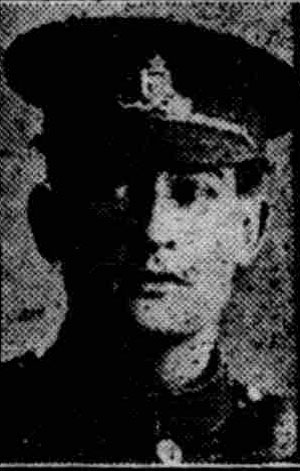
George Frederick Carpenter was born at Tonbridge
in 1896, the son of George and Annie Carpenter and lived in Garden Road. On
the outbreak of the war he joined the Royal Field Artillery, but was
subsequently transferred to the 7th Battalion Royal Irish Regiment where he
served as Private 10198 in “A” Company. He was captured on 21st March 1918
and held prisoner of war in Germany at Meschede POW Camp in Westphalia. By
the end of the war he had contracted dysentery and he died at the 14th
Stationary Hospital in France on 8th January 1919. He is buried at
Terlincthun British Cemetery, Wimille.
Albert George Carter was born at Tonbridge in
1888, the son of William and Constance Carter. In 1911 he married Edith
Farnes at Tonbridge and by the time of the 1911 census he was living with
her family in Norman Road Tunbridge Wells and working as a painter. He
enlisted as Driver 2025 Royal Engineers in 1914 and died on 17th October
1915, following complications after catching a chill. He is buried at
Tunbridge Wells Cemetery.
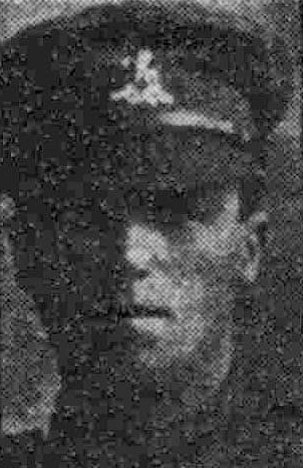
William Nelson Carter D.C.M. [Brother of Albert
George] was born at Tonbridge in 1893, the son of William and Constance
Carter, formerly living at Shipbourne Road and later moving to Church Row.
Before joining up he worked for Whitefriars Press. He enlisted in the Royal
West Kent Regiment on 1st September 1914. He served in the 3rd and 6th
Battalions of the Regiment, before being promoted Sergeant 767 in the 10th
Battalion on 5th December 1917. He had first gone to France on 1st June
1915, and then transferred to Italy in November of that year. He was
awarded the D.C.M. at about that time, the award being gazetted on 3rd June
1918. He returned to France in March 1918. He was gassed and wounded on 27th
April 1918, recovered and returned to the front only to be wounded again,
this time a gunshot wound, on 19th August 1918. He again returned to duty,
and was subsequently killed in action on 22nd October 1918. He is buried at
Dadizeele New British Cemetery.
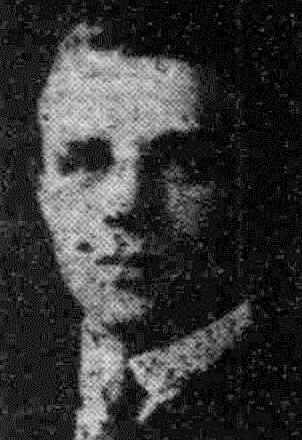
Sydney Charles Catt was born at Tonbridge in 1898,
the son of William Alfred and Elizabeth Martha Catt. In 1911 recorded as
living at 35, Pembury Grove. It was recorded that he worked for South
Eastern railways as a linesman. He enlisted in April 1917 as Private 37021,
3rd Battalion Norfolk Regiment. He left England on H.T. Aragon at the
beginning of December 1917 as one of a party of reinforcements bound for
Egypt. H.T. Aragon was torpedoed and sunk on the 30th December 1917 whilst
entering the port of Alexandria with the loss of 380 officers and men,
including Sydney Charles Catt. He has no known grave and is commemorated on
the Chatby Memorial.
Frederick Chalklin was born at Tonbridge in 1889,
the son of Harry and Emma Chalklin. By the time of the 1911 census he had
already enlisted in the Royal West Kent Regiment and was serving as a Lance
Corporal. At the outbreak of the war in August 1914, Frederick was serving
with the 2nd Battalion which was then stationed at Multan in India. At the
beginning of 1915 the Battalion was sent to Mesopotamia, arriving at Basra
on 6th February 1915. Frederick was then a Lance Sergeant L/9322 and served
in one of the two companies which were attached to the 30th Brigade, 6th
[Poona] Division. They were besieged at Kut-al-Amara and taken prisoner by
the Turkish Army on 29th April 1916. Frederick died from dysentery at Dorak
in Turkey on 7th November 1916 and is commemorated on the Basra Memorial. At the time of death his parents were living in Norfolk road Tonbridge.
Sidney George Champion was born at Tonbridge in
1886, the son of William and Mary Champion. He was married to Winifred
and lived at 22, Priory Road. He served as a Lieutenant in the Royal
Fusiliers attached to the 2nd Battalion King’s African Rifles who fought in
East Africa. He died of his wounds on 17th March 1917 and is
commemorated on the Dar Es Salaam British and Indian Memorial.
John Waterhouse Children was born at Tonbridge in
1887, the son of Richard and Marion Children. He attended Tonbridge School
from 1897 – 1904. On 12th March 1913 he left England bound for New York.
After the outbreak of the war he enlisted as Private 72167 27th Battalion
Canadian Infantry. He was killed in action on 15th September 1916. He has no
known grave and is commemorated on the Vimy Memorial.
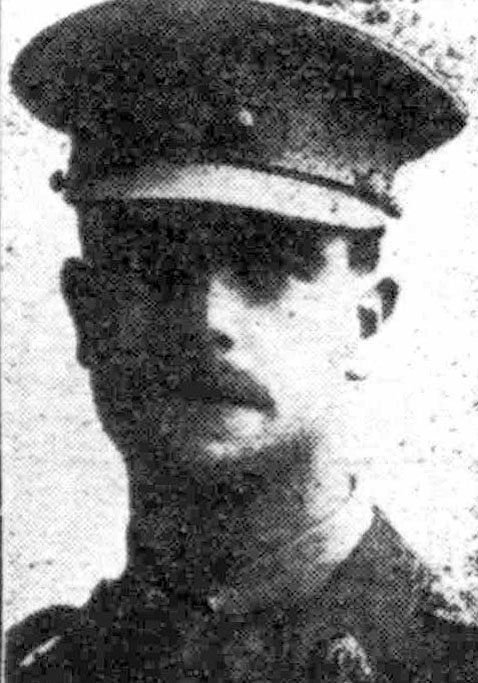
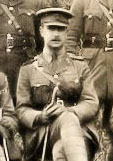
Murray Inglis Christie D.S.O. was born at Sydenham
in 1889, the son of George and Edith Christie. The family moved to Tonbridge
in the early 1900s, where George Christie was a wine merchant. In August
1914 Murray initiated and organised “A” Company 1st Mid Kent Volunteer
Fencibles, of which he was the platoon commander. He then enlisted in the
Honourable Artillery Company and subsequently obtained a commission in the
Royal Fusiliers. He won his D.S.O. on 20th September 1917 for leading his
men with great bravery to take their objective whilst under heavy enemy
fire. On February 18th 1918 he married Kathleen Dunham at Tonbridge, and
whilst on that same leave collected his D.S.O. at Buckingham Palace. Whilst
serving as Captain, “A” Company 32nd Battalion Royal Fusiliers, he took part
in the fierce fighting of the German Spring Offensive and was mortally
wounded on the 24th March 1918. He is buried at Bienvillers Military Cemetery.
Edward George Clack [sometimes recorded as Clark]
was born at Tonbridge in 1899, the son of Richard and Edith Clark and lived
in Lavender Hill. He served as Private Edward Clark GS/72272 1st Battalion
Royal Fusiliers attached to 1st Battalion London Regiment. He was killed in
action on 28th August 1918 and is buried at Queant Road Cemetery, Buissy.
Frederick William Clack was born at Tonbridge in
1886, the son of Frederick and Harriet Clack. In 1911 lived in 121, Pembury
Road. Before the war Frederick worked as a dustman for the council and he
also was a Territorial soldier serving with the 1st Battalion Royal West
Kent [T.E.]. He attested at Tonbridge on 23rd November 1914 for the Kent
Cyclist [Reserve] Battalion and was subsequently sent to India on 2nd
February 1917, and then transferred to the 1st/5th Battalion Royal West Kent
Regiment on 13th November 1917. He served in the Mesopotamia Expeditionary
Force, leaving India on 5th December 1917 and arriving at Basra on the 11th
December. He became ill on the 8th June 1918, initially diagnosed with
pleurisy, and died on 20th June 1918 on pneumonia at Baghdad. He is buried
at Baghdad [North Gate] War Cemetery.
S. W. Clack – not identified. No information on
this man.
Archie Ferguson Clark was born at Hertford in
1890, the son of Donald and Isabella Clark. Donald Clark was a regular
soldier, a Colour Sergeant, and Archie enlisted in the Scots Guards and was
already serving with them at the time of the 1911 census. At the outbreak of
war Archie was serving with the 2nd Battalion Scots Guards as Drummer 5408.
His Battalion landed at Le Havre on 7th October 1914. At the time of
death his parents were recorded as living in Hillcrest Hildenborough. He was
killed in action at Neuve Chapelle on 12th March 1915. He is buried at
Cabaret Rouge British Cemetery, Souchez.
Henry Clark was born at Peasmarsh, Sussex in 1882,
the son of Henry and Emily Clark. At some point after 1911 Henry, his wife
Mary Irene, and their four children moved to Havelock Road, Tonbridge. Henry
served as Private 42191, 1st Battalion North Staffordshire Regiment, and
before that as Private 22798 2nd Battalion Middlesex Regiment. He died on
31st August 1918, his entry in the Parish Church Memorial Book states:
“Killed by a hand grenade during a night attack”. He is commemorated on the
Vis-en-Artois Memorial.
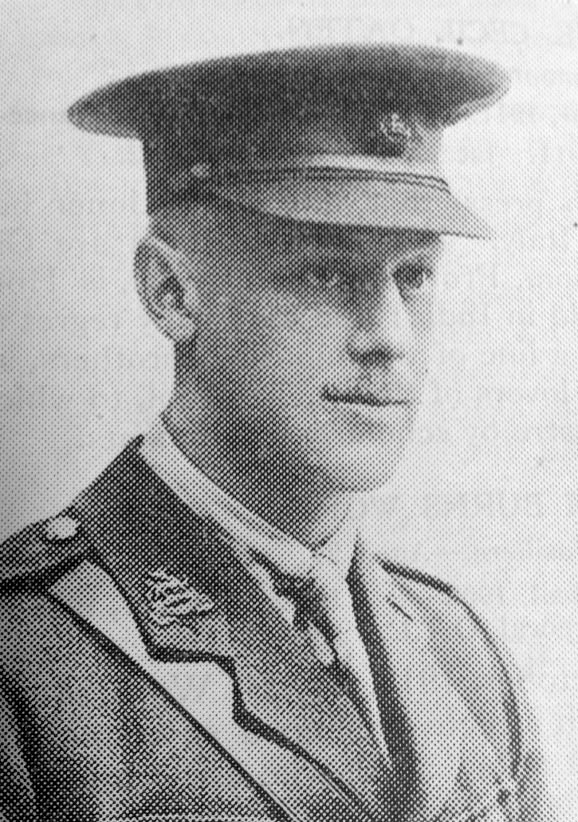
Claude Casburn Clements was born at Tunbridge
Wells in 1885, the son of Robert and Eva Clements. He was educated at
Skinners School, then worked for the Tunbridge Wells Advertiser before
working for a number of different commercial firms in Russia, Holland and
France. In 1912 he married Nellie May Grinyer at Tonbridge. He joined the
Queen’s Westminster Rifles in March 1917 and was subsequently gazetted as
2nd Lieutenant in the Royal Berkshire Regiment in April 1918. He was
attached to the 7th Battalion Northampton Regiment and killed in action near
Cambrai on 9th October 1918. He is buried at Cagnoncles Communal Cemetery.
John Clifton was born sometime between 1877 and
1881, probably at Tonbridge, but no birth registration has been found. He
married Emily Thomsett at Southborough in 1905. His parents, as named on his
army next of kin form, were John and Fanny Clifton. John and his family have
not been found in the census returns. He enlisted at Tonbridge as Private
G/16555 6th Battalion Royal West Kent Regiment on 15th July 1916 at the
stated age of 36 years and 4 months and that he lived at 138 Vale Road. He
had previously served for 5 years with the 3rd Royal West Kent Regiment,
pre-war Territorial service presumably. He was killed in action on 17th July
1917 and is buried at Vis-en-Artois British Cemetery, Haucourt.
Arthur Clough was born at Oldham in 1890, the son
of Ernest and Elizabeth [Hawkins] Clough. On 31st July 1906 Arthur enlisted
in the King’s Royal Rifle Corps, Private 7222. He served in India, recorded
there in the 1911 census. In 1913 he married Margaret Elizabeth Gudge at
Edmonton. Middlesex. At the outbreak of war he went to France with the 1st
Battalion King’s Royal Rifles, landing at Rouen on 13th August 1914. He was
captured on 2nd November 1914 and held a prisoner of war at Gustrow Camp,
where he died on 23rd December 1914. His connection with Tonbridge was that
by 1914 his father, Ernest, was living at Tonbridge and presumably was
still resident when the memorial was erected.
Harry Milton Cobb was born at Saltwood in 1882,
the son of Harry and Mary Cobb. In the mid-1880s the family moved to
Tonbridge and in 1908 Harry married Mabel Slaughter at Tonbridge and lived
in Sussex Road. Before the war Harry worked as an assistant for a fruiter
and greengrocer. He served initially with the Army Service Corps [Private
T/292922] and then with the 9th Battalion Manchester Regiment as Private
59640. He was reported missing in March 1918 near St Quentin; later reported
as killed in the 21st March 1918. He is buried at Jeancourt Communal
Cemetery Extension.
William Gordon Cobell was born at Camberwell in
1899, the son of William Frederick and Annie Marie Cobell. The family moved
to Tonbridge at some point after the 1911 census, when they were in Croydon,
and 1917, by which time they lived at Chichester Road. William Gordon worked
at Truscott Printers and was Private TR/10/31150 in the 32nd Battalion
Training Reserve when he was killed in an air raid at Dover on 22nd August
1917. He was buried at Tonbridge with full military honours on Monday 27th
August 1917.
George Cogger was born at Tonbridge in 1888, the
son of Henry and Eliza Cogger. In 1901 recorded as living at 12, Havelock
Road. George attested as a Telegraphist for the Royal Engineers on 25th
September 1906 at Tonbridge. He was transferred to the Army Reserve on 25th
September 1913, having completed 7 years’ service. He was recalled to the
colours at Aldershot on 5th August 1914 and went to France on 14th August
1914 where he served as Sapper 16339 1st Army Signal Company Royal
Engineers. He remained in France until he was admitted to hospital on 2nd
November 1916, suffering from a malignant growth in his intestines. He was
discharged as medically unfit on 23rd December 1916 and died at home in
Tonbridge on 19th January 1917. He is buried in Tonbridge Cemetery.
Clifton Henry Coleman was born at Ide Hill in
1889, the son of Lewis and Harriet Coleman. In 1901 recorded as living in
Lavender Hill. Clifton Henry left England for the United States at some
point before the 1911 census. He married and settled in Detroit, Michigan,
where he worked for the Canadian Pacific Railway as a dining car steward. On
10th January 1918 at London, Ontario, he attested for service as Private
3032830 20th Battalion Canadian Infantry. He was killed in action on the 9th
November 1918 and is buried at Cement House Cemetery.
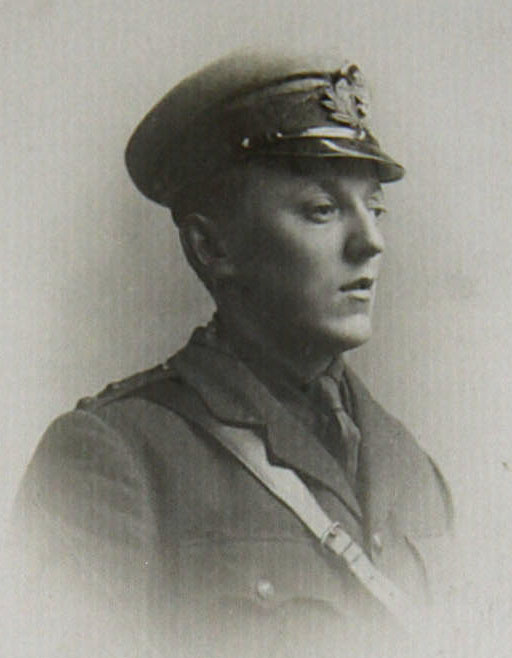
Tom Shorrock Collins was born in 1896 at Witley,
Surrey, the son of Thomas and Sarah Jane Collins. By 1911 the family were
living at ‘The Hectarage’, Tonbridge and Tom was a pupil at Tonbridge
School. Tom enlisted in the Public Schools Battalion on 31st May 1915 and
then obtained a commission as a Sub-Lieutenant in the Royal Naval Division,
on 12th November 1915. He served initially with the Anson Battalion at
Stavros in March 1916 as part of the Mediterranean Expeditionary Force. He
was then transferred to the Hood Battalion in May 1916. He became ill in in
November 1916 and was sent back to the UK to recover. On 15th June 1917 he
re-joined the Hood Battalion in France and was wounded on 10th October 1917
and died of his wounds at 3rd General Hospital Le Treport. [There is some
confusion over the date of his death – service record and Tonbridge School
both give the 10th October – CWGC has 23rd November.] He is buried at Mont
Huon Military Cemetery, Le Treport.
James “Jack” Louis Conzina [occasionally
“Counzina”] was born about 1880 in London, but his birth registration has not
been found; he was the son of Giacomo and Marie Conzina. He married Alice Towner in
1915 at St Pancras; Alice had been born and lived in Tonbridge. Jack
enlisted on 11th December 1915 at St Pancras, but was not called up until
15th June 1916 when he joined 3rd Battalion Norfolk Regiment as Private
20322. He went to France on 22nd December 1916 and served with the 1st
Battalion, Norfolk Regiment from 29th December 1916. He was killed in action
on 23rd April 1917 and is commemorated on the Arras Memorial. His widow and
daughter were then resident at 164 Vale Road in Tonbridge.

Ernest Cooke was born at Tonbridge in 1897, the
son of Stephen and Ellen Cooke. In 1911 he was living at 85 Vale Road and
worked as an errand boy for a printer, but then subsequently worked for Mr
Peters, who had a china shop on the High Street. He enlisted in the Royal
Engineers on 19th April 1915 and served as Sapper 2019, 1st/3rd Kent Field
Company Royal Engineers. He was one of the men who sailed on the Hythe and
who drowned on 28th October 1915. He has no known grave and is commemorated
on the Helles Memorial.
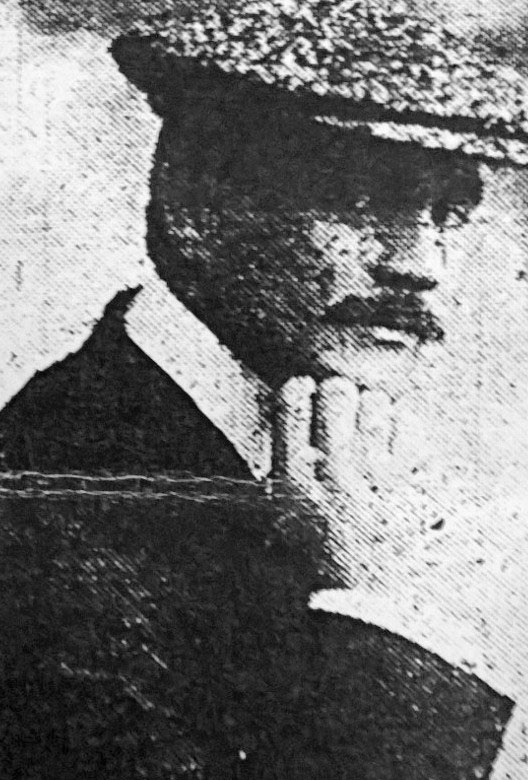
Fred Coomber was born at Tonbridge in 1887, the
son of William and Frances Coomber and lived in Priory Street. After leaving
school he worked as a draper’s assistant before enlisting with the Royal
West Kent Regiment, seeing service in India. He was back in Tonbridge
working as a postman at the outbreak of the war, when he was mobilised from
the Reserve as Private L/7568 1st Battalion Royal West Kent Regiment. He
went to France on 15th August 1914. He was wounded on October 27th at the
battle of the Aisne. He was sent back to the UK, where he spent some time at
Tidworth Hospital. He returned to his Battalion and was killed in action on
23rd April 1915. He has no known grave and is commemorated on the Ypres
[Menin Gate] Memorial.
Maynard Cooper was born at Westerham in 1889, the
son of Harry and Annie Cooper. In 1901 recorded as living in Mill Crescent,
Tonbridge. By the time of the 1911 census Maynard was working in
Littlehampton as an auctioneer’s clerk. He attested for service in the
Sussex Yeomanry on 10th November 1913, as Private 1676; he had previously
served in the West Kent Yeomanry. He was promoted to the rank of sergeant
over the course of the following two years, but then discharged as being no
longer fit for war service on 12th August 1916. He died some two years later
in late 1918. His brother Harry served as a Sapper in the Royal Engineers
and he was killed in action on 3rd November 1915 at Gallipoli.
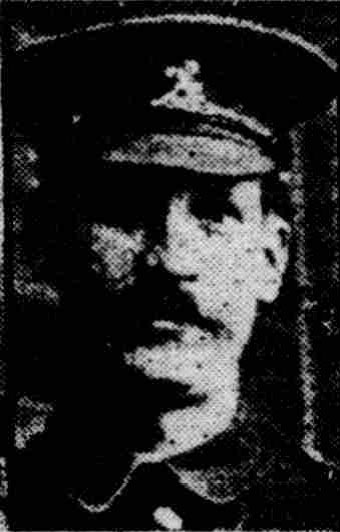
George Corke was born at Tonbridge in 1885, the
son of George and Maryann Corke. He married Florence Margaret Ware in 1907
at Tonbridge. At the time of his death she was living at Kinnings Row. He
enlisted in the Royal West Kent Regiment in October 1914 and served as
Private 34421 2nd/4th Battalion at Gallipoli, landing at Sulva Bay on 11th
August 1915, and later in Palestine. He was probably wounded at some point
as he was transferred to the Labour Corps, serving as Lance Corporal 548658
in the 812th Area Employment Company. He died on 13th January 1919 at the
General Hospital, Alexandria and is buried at Alexandria [Hadra] War
Cemetery.
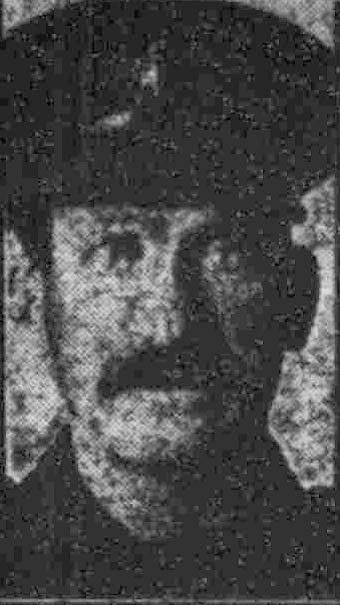
William Corke [brother to George ] was born at
Tonbridge in 1873. He married Caroline Collins in 1898 at Tonbridge. In 1911
recorded as living at 23, Dernier Road but time of his death she was living
in Shipbourne Road. He worked at the Baltic Saw Mills and then Whitefriars
press before joining up. He enlisted in the 7th Battalion Royal Sussex
Regiment as Private G/13159 on 20th June 1916, two weeks after the death of
his son William at Jutland – see below. He went to France the following
September. He was killed in action on 20th November 1917. He is commemorated
on the Cambrai Memorial.
William Corke [son of William ] was born at
Tonbridge in 1897, the son of William and Caroline Corke. He enlisted in the
Royal Navy on 21st February 1915. On 31st August 1915 he joined HMS Defence
as an Ordinary Seaman and was rated Able Bodied on 13th April 1916. HMS
Defence was sunk with the loss of 900 men at battle of Jutland on 31st May
1916.
Ernest Coulstock was born in or about 1885 at Red
Hill, the son of Henry and Clara Coulstock. [He seems to have been
enumerated in the 1901 and 1911 census returns as “Henry” and his birth year
was given as 1883 in the newspaper report of his death. No registration for
an Ernest Coulstock has been found between 1883 – 1885; although the birth
of a Henry Coulstock was registered at Reigate (included Red Hill) in 1885.]
In January 1909 Ernest joined the Special Reserve of the Royal Sussex
Regiment, attending camp every year. In 1911 he was recorded as living at 3,
The Botany. In August 1914 he was mobilised at Chichester and after training
went to France on 10th November 1914 as Private SR/713 Royal Sussex
Regiment. He was wounded in action and later, following amputation of his
left leg, he died of his wounds at the Duchess of Westminster’s Hospital Le
Touquet, on 30th January 1915. He is buried at Le Touquet-Paris Plage
Cemetery.
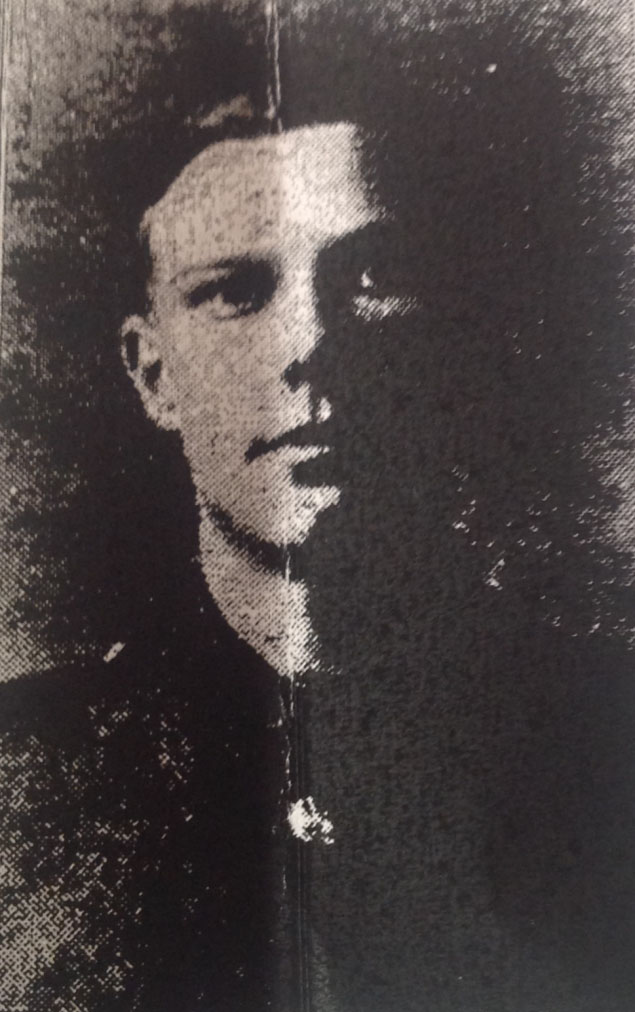
James Coulstock [brother of Ernest ] was born at
Red Hill in 1896, the son of Henry and Clara Coulstock. The family had lived
in Tonbridge since at least the 1901 census. At the time of his death
his parents were recorded as living in Norfolk Road, and had 5 sons serving.
James had enlisted at Tonbridge as Private S/8620 1st Battalion Royal West
Kent Regiment. He went to France on 7th December 1914 and died of his wounds
on 18th June 1915. He is buried at Dickebusch New Military Cemetery.
George Crampton is presumed to be the Herbert George
Crampton who was born at Stoke Newington in 1885, the son of George and
Elizabeth Crampton. By the time of the 1901 census the family were living at
Lansdowne Road and Herbert George was working as a junior clerk at the Gas
Works. In 1908 he married Alethea Snelling at Tonbridge. He served as
Private G/12334 Royal Sussex Regiment, later transferred as Private G/40348
3rd/10th Battalion Middlesex Regiment. He was wounded in France and sent
home where he died on 2nd November 1917. He is buried in Tonbridge Cemetery.
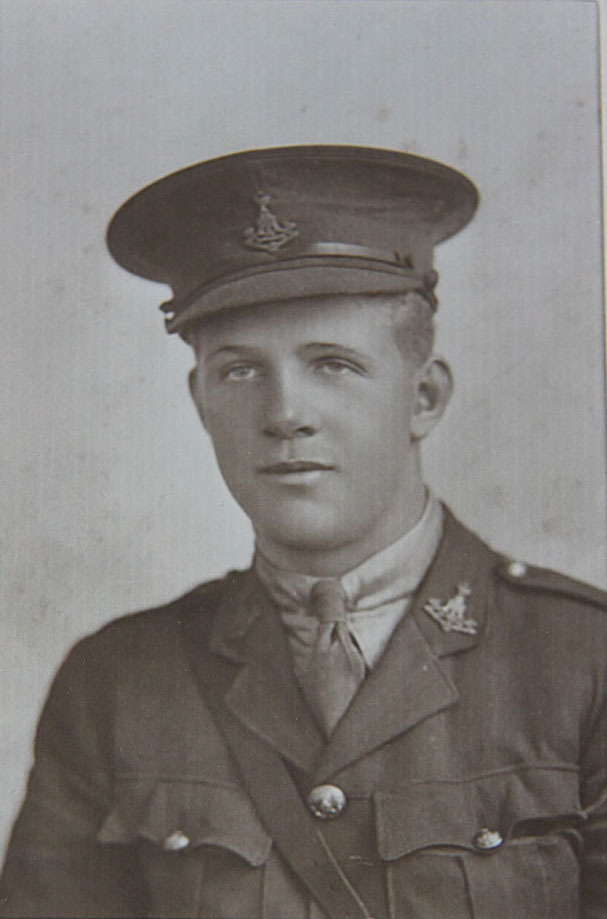
George Ernest Lister Cressey was born at Nelson,
New Zealand in 1895, the son of George and Minnie Cressey. He was educated
at Tonbridge School 1908 – 1914, and at the outbreak of war obtained a
commission in the Kent Cyclist Corps. After additional training at Sandhurst
he was gazetted as Lieutenant in the 2nd Battalion Yorkshire Regiment on
13th May 1915. He was killed in action on 26th September 1915 and is
commemorated on the Loos Memorial.
Jack Cripps was born at Tonbridge in 1874, the son
of William and Elizabeth Cripps. He entered the Royal Navy, as a Boy 2nd
Class, on 5th November 1890 serving on HMS Impregnable. He served in the
Navy for the remainder of his life, moving through the ranks – Ordinary
Seaman, Able Bodied, Leading Seaman, Petty Officer and Ship’s Corporal. He
joined HMS Formidable as Ship’s Corporal 1st Class on 20th June 1913. He was
killed on 1st January 1915 when HMS Formidable was torpedoed and sunk by a
German submarine with the loss of some 550 officers and men. He is
commemorated on the Chatham Memorial. He left a widow, Frances Emma
[Mockett] whom he had married at Sheppey on 5th November 1912, and address
recorded as Chaucer Road Gilingham. At the time of his death his parents
were living in Sussex Road Tonbridge.
E. Crook: There is an Ernest Cook on the Tonbridge
Oddfellows Memorial, and an Ernest Cooke on the original Memorial; otherwise
nothing is known.
Cecil Croucher was born at East Peckham in 1897.
The son of Edward and Elizabeth Croucher. He was educated at Tonbridge
School 1911 – 1915, He enlisted initially as Private 5880 Inns of Court
O.T.C. and was then commissioned as 2nd Lieutenant 6th Battalion Notts &
Derby Regiment. He died on active service in France on 26th February 1917.
He is buried at Warlingcourt Halte British Cemetery, Saulty.
George Henry Crouch was born at Brightling, Sussex
in 1885, the son of George and Alice Crouch. The family moved to Tonbridge
in about 1900 and by the time of the 1911 census George Henry was working as
a carman for the laundry. In that same year he married Nellie Lucas and
lived in Vale Road Tonbridge. He attested as Private G/4838 in the East Kent
Regiment on 1st December 1914 at Tonbridge. He went to France on 12th May
1915 and served with the 2nd Battalion. He was wounded in action on the 25th
May and had his leg amputated in hospital; he died of his wounds on 30th May
1915, just 18 days after his arrival in France. He is buried at Boulogne
Eastern Cemetery.
Tom Curtis was born at Tonbridge in 1896, the son
of William and Beatrice Curtis. In 1911 he is recorded as living at
77, Priory Road. After leaving school he worked as a machine boy for one of
the local printers, and then in a butcher’s shop. He attested for the Royal
West Kent Regiment at Maidstone on 4th August 1914, the day war was
declared. Tom Curtis was posted to the 7th Battalion RWK on 24th August 1915
and landed in France the following day– the 7th Battalion had landed at Le
Havre on 27th July 1915 so he was, presumably, sent in a reinforcement
draft. He had two spells at Depot – usually this would signify that he had
been incapacitated in some way, wound or sickness, or a period of
re-training. Unfortunately not enough of his service record has survived to
confirm this. He ended up serving with the 6th Battalion which had been in
France since 1st June 1915. He was presumed to have died on or after 30th
November 1917. He has no known grave and is commemorated on the Cambrai
Memorial.
George Cushings – not identified. No information
on this man.
▲Top

